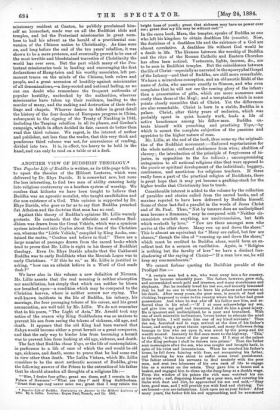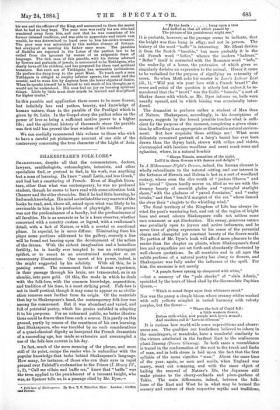ANOTHER VIEW OF BUDDHIST THEOLOGY.* THE Popular Life of Buddha
is written, as its title-page tells us, 'to upset the theories of the Hibbert Lectures, which were -delivered by Dr. Rhys Davids. It is somewhat new, but none the less interesting, to find two men of ability entering hotly into religions controversy on a heathen system of worship. We confess that hitherto we have been taught to believe that Buddha was an agnostic moralist, who taught annihilation and the non-existence of a God. This opinion is supported by Dr. Ithys Davids, who goes so far as to say that Buddha preached flat Atheism and the doctrine that man has no soul.
Against this theory of Buddha's opinions Mr. Lillie warmly protests. He contends that the atheistic and soulless Bud- dhism was drawn from the Great Vehicle, which was a spurious system introduced. into Ceylon about the time of the Christian era, whereas the "Little Vehicle," compiled by King Asoka, con- tained the motto, " Confess and believe in God." There are a large number of passages drawn from the sacred books which tend to prove that Mr. Lillie is right in his theory of Buddhist theology. Even Dr. Rhys Davids admits that the Cakkarati Buddha was to early Buddhists what the Messiah Logos was to -early Christians. " If this be so," as Mr. Lillie is justified in asking, "how can an atheist believe in a Word of God made flesh ?"
We have also in this volume a new definition of Nirvana. Mr. Lillie asserts that the real meaning is neither absorption nor annihilation, but simply that which can neither be blown nor breathed upon—a condition which may be compared to the Christian heaven, where is neither sorrow nor crying. The well-known incidents in the life of Buddha, his infancy, his marriage, the four presaging tokens of his career, and his great renunciation, are well told by Mr. Lillie. We do not remember that in his poem, " The Light of Asia," Mr. Arnold took any notice of the reason why King Snddhodana was so anxious to prevent his son from seeing the tokens of sickness, old age, and -death. It appears that the old King had been warned that -Sakya would become either a great hermit or a great conqueror, and that the only way to hinder him from becoming a hermit was to prevent him from looking at old age, sickness, and death.
The fact that Buddha chose Yoga, or the life of contemplation, in preference to a life of ease of which the end would be old age, sickness, and death, seems to prove that he had some end in view other than death. The Lalita, Vistara, which Mr. Lillie -considers to be the most authentic account of Buddha, gives the following answer of the Prince to the entreaties of his father that he should abandon all thoughts of a religious life:— " Sire, I desire four gifts ; grant me these, and I remain in the Palace of Summer.'—` What are they ?' said King Saddhodana. Grant that age may never seize me; grant that I may retain the • Popular Life of Buddha. Containing an Answer to the Hibbert Lectures of 1881. By A. Lillie. London : Hogan Paul, Trench, and Co. 1883.
bright hues of youth ; grant that sickness may have no power over me; grant that my life may be without end.' "
In the same book, Mara, the tempter, speaks of Buddha as one
who left his kingdom to obtain deathless life (anwita). Now, the doctrines of a deathless life and the existence of a God are
almost correlative. A deathless life without God would be a death in life. The likeness between the worship of Buddha and the rites of the Roman Catholic and Eastern Churches has often been noticed. Vestments, lights, incense, &c., are to be seen in Buddhist temples. But the coincidences between the life of Christ—especially as narrated in the apocryphal Gospel of the Infancy—and that of Buddha, are still more remarkable.
We have a miraculous conception, and an old ascetic Rishi of the name of Asita, who answers exactly to Simeon, and who even complains that he will not see the coming glory of the infant; then a presentation of gifts, which are more numerous and costly than those of the Magi ; and a temptation which in some points closely resembles that of Christ. Yet the differences are also remarkable. Christ is born in a stable, Buddha in a palace. Christ, after thirty years of seclusion, which was
probably spent in quiet homely work, leads a life of active beneficence among his fellow-men. Buddha on- tents himself with preaching and practising Yoga,—by
which is meant the complete subjection of the passions and appetites to the higher nature of man. Mr. Lillie, at the end of the book, thus sums up the originali- ties of the Buddhist movement :—Enforced vegetarianism for the whole nation ; enforced abstinence from wine; abolition of slavery ; the introduction of the principle of forgiveness of in-
juries, in opposition to the lex talionis ; uncompromising antagonism to all national religions rites that were opposed to the gnosis or spiritual development of the individual; beggary, continence, and asceticism for religious teachers. If these really form a part of the practical religion of Buddhists, there
is great hope that it may yet become a grafting-stock for the higher truths that Christianity has to teach.
Considerable interest is added to the volume by the collection of parables and stories culled from the sacred books, and of maxims reputed to have been delivered by Buddha himself.
Some of these last find a parallel in the words of Jesus Christ and of St. Paul. Thus, " Not by tonsure does an undisciplined man become a Sramana," may be compared with "Neither cir- cumcision availeth anything, nor uncircumcision, but faith which worketh by love." "Few are there amongst men who arrive at the other shore. Many run up and down the shore." This is almost an equivalent for " Many are called, but few are chosen," though the idea of "running up and down the shore," which must be credited to Buddha alone, would form an ex- cellent text for a sermon on vacillation. Again, in " Religion is nothing but the faculty of love " we have a distinct fore- shadowing of the saying of Christ—" If a man love me, he will keep my commandments."
We cannot forbear quoting the Buddhist parable of the Prodigal Son :-
"A certain man had a son, who went away into a far country. There he became miserably poor. The father, however, grew rich, and accumulated much gold and treasure, and many storehouses and elephants. But be tenderly loved his lost sou, and secretly lamented that he bad no one to whom to leave his palaces and suvernas at his death. After many years, the poor man, in search of food and clothing, happened to come to the country where his father had great possessions. And when he was afar off his father saw him, and re- flected thus in his mind :—`If I at once acknowledge my son, and give him my gold and treasures, I shall do him a great injury. He is ignorant and undisciplined, he is poor and brutalised. With one of such miserable inclinations, 'twere better to educate the mind little by little. I will make him one of my hired servants.' Then the son, famished and in rags, arrived at the door of his father's house, and seeing a great throne upraised, and many followers doing homage to him who sat upon it was awed by the pomp and the wealth around. Instantly he fled once more to the highway. ' This,' he thought, 'is the house of the poor man. If I stay at the palace of the King perhaps I shall be thrown into prison.' Then the father sent messengers after the son, who was caught and brought back, in spite of his cries and lamentations. When he reached his father's house, he fell down fainting with fear, not recognising his father, and believing he was about to suffer some cruel punishment. The father ordered his servants to deal tenderly with the poor man, and sent two labourers of his own rank of life to engage him as a servant on the estate. They gave him a broom and a basket, and engaged him to clean up the dung-heap at a double wage. From the window of his palace the rich man watched his son at his work; and, disguising himself as a poor man, and covering his limbs with dust and dirt, he approached his son and said,—' Stay here, good man, and I will provide you with food and clothing. You are honest—you are industrious. Look upon me as your father.' After many years, the father felt his end approaching, and he summoned
his son and the officers of the King, and announced to them the secret that he had so long kept. The poor man was really his son who had wandered away from him, and now that he was conscious of his former debased condition, and was able to appreciate and retain vast wealth, he was determined to hand over to him his entire treasure. The poor man was astonished at this sudden change of fortune, but overjoyed at meeting his father once more. The parables of Buddha are reported in the Lotus of the perfect law to be veiled from the ignorant by means of an enigmatio form of language. The rich man of this parable, with his throne adorned by flowers and garlands of jewels, is announced to be Tirthigata, who dearly loves all his children, and has prepared for them vast spiritual treasures. But each eon of Tirthigata has miserable inclinations. He prefers the dung-heap to the pearl Mani. To teach snob a man Tirthigata is obliged to employ inferior agents, the monk and the ascetic, and to wean him by degrees from the lower objects of desire. When he speaks himself he is forced to veil much of his thought., as it would not be understood. His sons feel no joy on learning spiritual things. Little by little must their minds be trained and disciplined for higher truths."
In this parable and application there seems to be more finesse, but infinitely less real pathos, beauty, and knowledge of human nature, than in the parable of the Prodigal which is given by St. Luke. In the Gospel story the pathos relies on the power of love as being a sufficient motive power to a higher life ; and the spiritual history of thousands since the parable was first told has proved the true wisdom of his conduct.
We can cordially recommend this volume to those who wish to have a careful yet picturesque account of one side of the controversy concerning the true character of the Light of Asia.

































 Previous page
Previous page